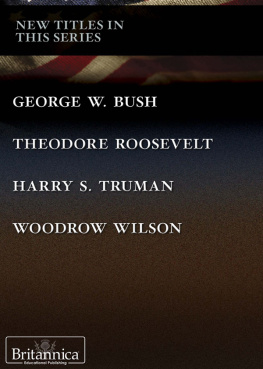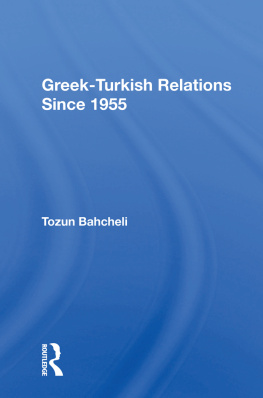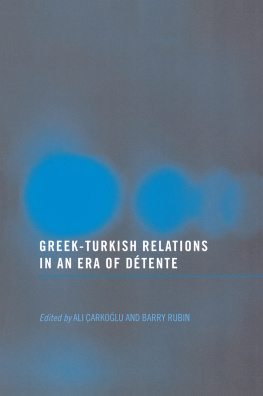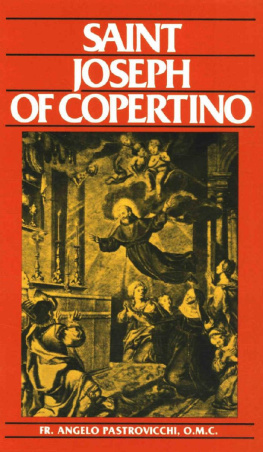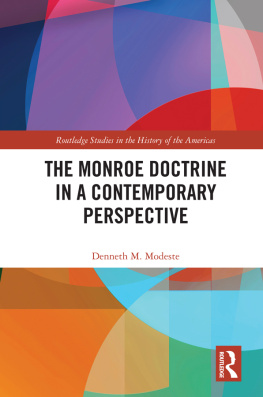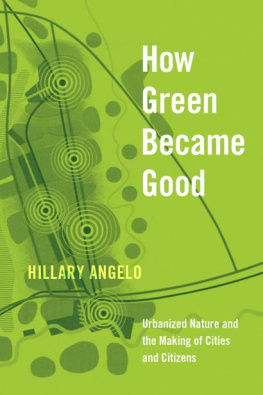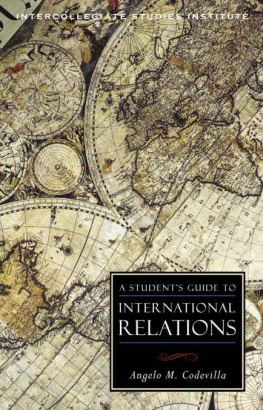
Greek-American Relations from Monroe to Truman
NEW STUDIES IN U.S. FOREIGN RELATIONS
Mary Ann Heiss, editor
The Birth of Development: How the World Bank, Food and Agriculture Organization, and World Health Organization Changed the World, 19451965
AMY L. S. STAPLES
Colombia and the United States: The Making of an Inter-American Alliance, 19391960
BRADLEY LYNN COLEMAN
NATO and the Warsaw Pact: Intrabloc Conflicts
EDITED BY MARY ANN HEISS AND S. VICTOR PAPACOSMA
Caution and Cooperation: The American Civil War in British-American Relations
PHILIP E. MYERS
The Will to Believe: Woodrow Wilson, World War I, and Americas Strategy for Peace and Security
ROSS A. KENNEDY
Leading Them to the Promised Land: Woodrow Wilson, Covenant Theology, and the Mexican Revolution, 19131915
MARK BENBOW
Modernity and National Identity in the United States and East Asia, 18951919
CAROL C. CHIN
Seeing Drugs: Modernization, Counterinsurgency, and U.S. Narcotics Control in the Third World, 19691976
DANIEL WEIMER
Safe for Decolonization: The Eisenhower Administration, Britain, and Singapore
S. R. JOEY LONG
Arguing Americanism: Franco Lobbyists, Roosevelts Foreign Policy, and the Spanish Civil War
MICHAEL E. CHAPMAN
Trilateralism and Beyond: Great Power Politics and the Korean Security Dilemma during and after the Cold War
EDITED BY ROBERT A. WAMPLER
NATO after Sixty Years: A Stable Crisis
EDITED BY JAMES SPERLING AND S. VICTOR PAPACOSMA
Uruguay and the United States, 19031929: Diplomacy in the Progressive Era
JAMES C. KNARR
Buried in the Sands of the Ogaden: The United States, the Horn of Africa, and the Demise of Dtente
LOUISE WOODROOFE
NATO before the Korean War: April 1949June 1950
LAWRENCE S. KAPLAN
Greek-American Relations from Monroe to Truman
ANGELO REPOUSIS
Greek-American Relations
from Monroe to Truman
A NGELO R EPOUSIS
The Kent State University Press
Kent, Ohio
2013 by The Kent State University Press, Kent, Ohio 44242
ALL RIGHTS RESERVED
Library of Congress Catalog Card Number 2012048649
ISBN 978-1-60635-177-2
Manufactured in the United States of America
A portion of chapter four appeared originally in the Journal of the Early Republic 24:3 (2004) and is used with permission. Copyright 2004 Society for Historians of the Early American Republic. All rights reserved.
A portion of chapter five appeared originally in Diplomatic History 33:4 (November 2009) and is used with permission. Copyright 2009 The Society for Historians of American Foreign Relations (SHAFR).
LIBRARY OF CONGRESS CATALOGING-IN-PUBLICATION DATA
Repousis, Angelo.
Greek-American relations from Monroe to Truman / Angelo Repousis.
pages cm. (New studies in U.S. foreign relations)
Includes bibliographical references and index.
ISBN 978-1-60635-177-2 (hardcover)
1. United StatesForeign relationsGreece.
2. GreeceForeign relationsUnited States. I. Title.
E183.8.G8R47 2013
327.73049509034dc23
2012048649
17 16 15 14 13 5 4 3 2 1
Contents
Acknowledgments
There are a number of individuals who have helped in the preparation of this book who I acknowledge here.
Much of the research was conducted at the National Archives, Library of Congress, Temple University, Harvard University, University of Pennsylvania, Massachusetts Historical Society, the Historical Society of Pennsylvania, the American Presbyterian Historical Society, the Balch Institute for Ethnic Studies, and the Library Company of Philadelphia. I am indebted to the archivists and librarians of these institutions who were helpful in obtaining manuscripts, documents, and secondary sources, some of which were quite obscure and difficult to locate.
A dissertation completion grant from the graduate school at Temple University expedited progress toward completion of my dissertation.
I acknowledge the collective contribution of several scholars who generously provided me with helpful suggestions and criticisms of some or all of the book manuscript. I am very grateful to Herbert Ershkowitz, Margaret Marsh, and Alexander Kitroeff, who served on my dissertation committee. I owe a special debt of gratitude to professor Richard H. Immerman at Temple University, who, as dissertation committee chair, guided and encouraged me in all phases of my doctoral work and, then offered helpful suggestions and serving as a sounding board as I prepared the manuscript for publication. He has continued to be both a mentor and friend. His personal kindness, intellectual generosity, and unwavering encouragement to not give up on the manuscript helped make this book possible.
Thanks to Professor Mary Ann Heiss, editor of the New Series in U.S. Foreign Relations series at the Kent State University Press, who helped improve the manuscript immeasurably with her detailed and thoughtful evaluations. I also thank my copyeditor, Joanna Craig, for her suggestions and work in helping clean up the manuscript for publication. Professor John O. Iatrides also contributed incisive analysis and commentary during the later stages of this work, especially for .
I am grateful as well to the anonymous reviewers of the Pennsylvania Magazine of History and Biography, Journal of the Early Republic, and Diplomatic History who critiqued articles extracted from this work. I thank the Journal of the Early Republic for permission to use the substance of my 2004 article The Trojan Women: Emma Hart Willard and the Troy Society for the Advancement of Female Education in Greece in of this volume.
Introduction
The benefits which the Greeks derived from the noble and benevolent exertions of the great American Nation of the United States are innumerable. Americans endowed by nature with a warm heart, and inspired by the noble history of Hellas... hailed with delight the glorious resurrection of Greece in 1821. Since that time Greece has discovered in the United States a great Patron, who pitied her misfortunes and succored her needs.
Constantine Maniakes, America and Greece (1899)
In October of 2000, former U.S. ambassador to Greece Nicholas Burns, together with Athens mayor Dimitris Avramopoulos, rededicated the monument to the American philhellenes who fought for Greek independence that was first donated by the American Legion in 1930. Later that month the ambassador helped dedicate a new permanent exhibition in the U.S. embassy lobby on the history of U.S.-Greek relations from the 1820s to the twenty-first century. These monuments and exhibitions, Burns noted, are testimony to the power of memory and history in Americas relations with Greece. Our hope is that these events will permit us to remember all that has been good and positive in our relationship and to look toward the future with confidence. Public statements by top officials, like the one given by President George W. Bush during the signing of a presidential proclamation for Greek Independence Day on March 23, 2001, highlight the mutually constructive and historic relationship between the two countries and seem to hearken back to an earlier time:




